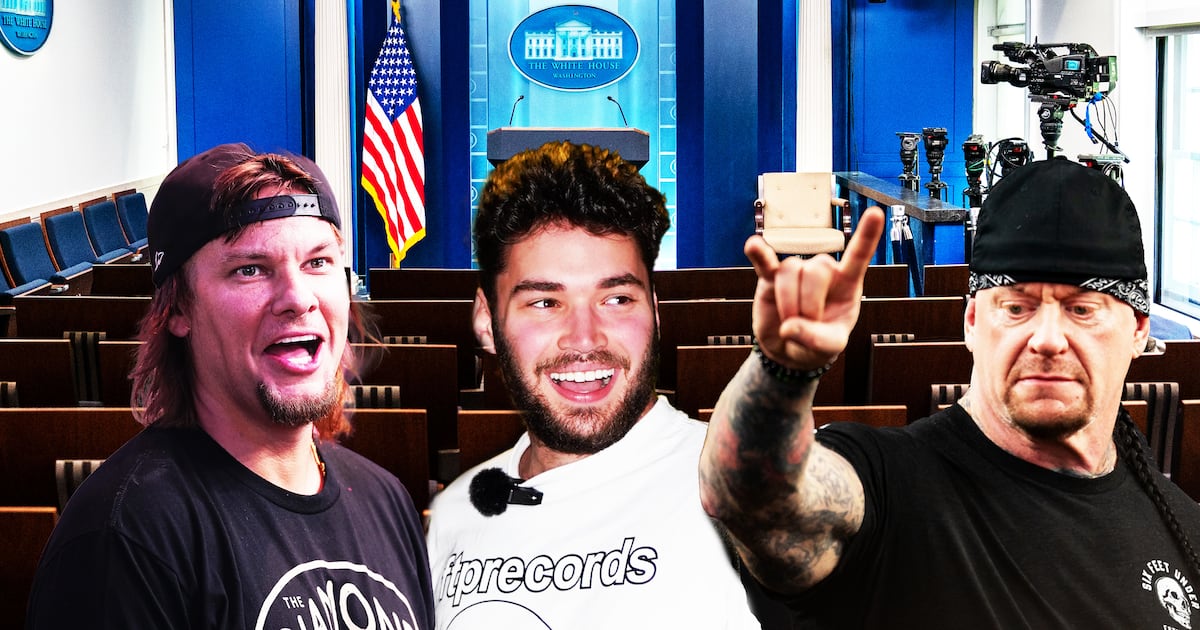With a new film version of Jane Eyre now in theaters and an adaptation of Wuthering Heights coming later this year, fans of authors Charlotte and Emily Brontë are choosing sides. Jennie Yabroff examines which sister was the better author.
One is "poor, obscure, plain and little"; the other is a "wild, wick slip." One marries, and lives happily ever after. The other dies, and haunts her childhood home as a restless ghost. Forget Kim and Kourtney Kardashian. As a new version of Jane Eyre opened last week, to be followed by an adaptation of Wuthering Heights later this year, the debate of 2011 is shaping up to be: Charlotte or Emily Brontë?

Ever since the release of Charlotte's Jane Eyre and Emily's Wuthering Heights within months of each other in 1847, the Brontë sibling rivalry has been an epic war of words. (A third sister, Anne, also published a novel that year, but aside from a few contrarians who insist she’s the best of the Brontës, her work has largely been forgotten.) On literature discussion boards, fans passionately champion Charlotte’s book or Emily’s. "I'd ten times rather spend an afternoon in Jane's company than Catherine's," reads one typical comment promoting virtuous Jane Eyre, an unloved orphan who grows up to become a governess and marry her employer, Mr. Rochester. In response, a Wuthering Heights fan disses Jane as "impenetrably boring" compared with the tempestuous Cathy, who literally dies of love for her Heathcliff. The debate will continue as Mia Wasikowska ( Alice in Wonderland) dons her dowdiest dress and pins her hair into a washerwoman's bun to play Jane, and again when Kaya Scodelario (of the British TV series Skins) cinches her waist and lets her dark tresses tangle dramatically as Cathy. Jane may be smarter, and Cathy may be sexier, but when it comes to which book will endure, the answer is surprising.
ADVERTISEMENT
Jane Eyre was an instant bestseller when it was published. It routinely outranks Wuthering Heights on best-books lists, and was the first to be adapted for the screen, as a silent film in 1910. Since then, there have been 21 more movie and television adaptations of Jane Eyre, compared with just 15 screen versions of Wuthering Heights. (The best-known version is the Orson Welles/Joan Fontaine film of 1943; a young Anna Paquin plays Jane in a 1996 remake.) It inspired Daphne du Maurier’s novel Rebecca (and the subsequent Alfred Hitchcock film) and Jean Rhys’s prequel, Wide Sargasso Sea. And when Penguin Classics did a special hardback printing of both novels in 2009, Jane Eyre outsold Wuthering Heights, 16,000 copies to 15,000. “It’s the story of a woman who demands to be judged for who she is, which has an enduring appeal,” says Juliet Barker, author of several biographies of the Brontë family.
Little sister Emily Brontë's Wuthering Heights was not as instantly beloved. Early critics called it 'a strange, inartistic story' with 'purposeless power.'
Little sister Emily Brontë's Wuthering Heights was not as instantly beloved. Early critics called it "a strange, inartistic story" with "purposeless power." Within two years of publication, Emily was dead of tuberculosis, her one and only novel seemingly destined to sink into obscurity. (Anne died the same year.) But in the 20th century Emily started gaining on Charlotte in the popularity race. Critics rediscovered Wuthering Heights, praising its complicated, nonlinear structure. A 1939 film starring Laurence Olivier and Merle Oberon was nominated for a best-picture Oscar and cemented the story in the public imagination as a Gothic saga of doomed love. Decades later, a teenage Kate Bush would see the last 10 minutes of the film on TV and be inspired to write her first No. 1 hit, "Wuthering Heights," convincing a generation of '80s-era sexy-sprite wannabes that nothing is more romantic than a cold, wet ghost banging on your window and demanding to be let in.
But no one has done more for Team Emily than Bella of the Twilight franchise. Her favorite novel is Wuthering Heights (she first reads it as a school assignment, and in the third book, Eclipse, she and Edward trade Cathy and Heathcliff quotes about, of course, undying love). When HarperCollins released a paperback of the book in the U.K. "endorsed" by Bella and Edward, sales quadrupled. “ Wuthering Heights has always appealed more to teenagers,” says Cristina Lara, curator of the Bronte Blog, an exhaustive and very serious-minded compendium of all things Brontë. (Lara and her co-curator, Manuel Del Estal, decline to choose between the two books.) “It’s a rite-of-passage kind of novel.”
If most readers first encounter the books in high school, like Bella, or through the movies, like Kate Bush, the question of preference may have to do more with hormones than literary analysis. In that case, no wonder Wuthering Heights has so many rabid, panting fans. Heathcliff, with his smoldering moodiness, is the original bad boy. “I never read Wuthering Heights, but some of my female friends love it because of Heathcliff,” says Jane Eyre director Cary Fukunaga. Some critics argue that Wuthering Heights is, in fact, a story of hate, of Heathcliff’s revenge on Cathy’s family for mistreating him, but whether readers who find Heathcliff desperately romantic actually understand the book doesn’t matter. For many readers, Jane vs. Cathy is really a question of Rochester vs. Heathcliff. In the new Jane Eyre, Rochester is played by Michael Fassbender as a dark-haired, broad-shouldered sensualist who appears in a very skimpy nightshirt in one scene. Score one for Team Jane.
Jennie Yabroff is a staff writer at Newsweek covering books, movies, food, and art.






